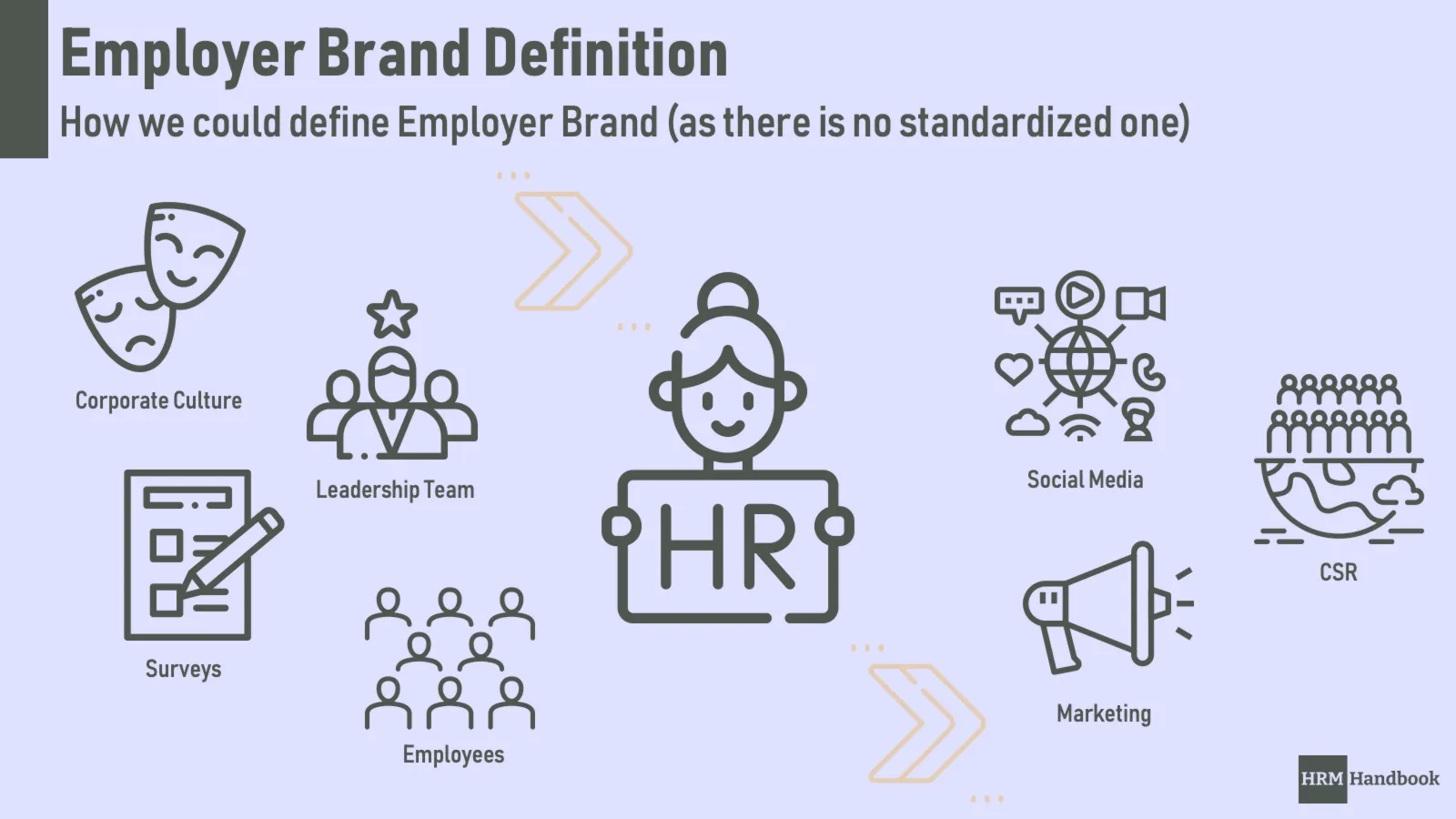What is Employer Brand? A Brief Definition
We have to openly admit that there is no exact definition of Employer Brand, every company or organization sees it a little differently. Similarly, each consultancy firm will present the whole area slightly differently, depending on which aspect they are more focused on and where their expertise lies. However, there is a general angst about what the field of HRM should be about in this way. So let’s take a look at it together, what all is covered under this area.
Employer branding is the process of managing and influencing an employer’s reputation among job applicants, employees and key stakeholders (and is not a pure HR activity). That is, we seek to positively influence all target groups to consider the company or organisation as their employer of first choice.
It encompasses everything HR does to present the organisation as an employer of choice. Of course, beware, there is EB that is managed, but there is also unmanaged EB that is created based on reputation without the company’s input. This of course is not under the control of the company and is thus dangerous.
Even if the firm doesn’t say anything about itself, it still has a reputation and the firm just doesn’t control or influence the discussion in any way. Then its reputation is purely made up of what employees and especially ex-employees say about it. And often the rule of thumb is that the worse the divorce, the louder and juicier the news circulating about the company from ear to ear. That’s the messy part of Employer Brand.
Why does the company do it?
The job market is highly competitive and only a company that is visible and has a good reputation has a chance of being able to choose from the best candidates. It will have no problem filling positions as it grows and will also have an easier time maintaining work ethic.

However, it is often the case that a company only gets into employer branding when it has difficulty recruiting new employees. And it neglects important steps in creating a truly attractive brand in the job market.
This is not all EB benefits, there’s a whole page dedicated to the benefits a company gets when it invests in this area of human resource management. I would also recommend studying EB goals.
So what is it? And what is it about?
Employer Brand can also be defined from an employee perspective. In this case, the Employer Brand is your organization’s reputation as an employer. Simply put, it’s what job seekers and employees really think of you and what they tell their friends and family when you’re not around. While it may not be tangible, your employer brand is a very valuable asset that requires constant nurturing, cultivating, influencing and refining.
Why “manage” and “influence” instead of “own” or “dictate”? Because the employer brand is not something the company owns. An employer brand exists in the minds of candidates and employees and is shaped by their thoughts and impressions. Every organization has an employer brand, whether they actively manage it or not.
Candidates and employees have an opinion of you, and if you don’t try to influence it, you are at their mercy.
It’s essential to think of the overall recruitment and retention effort and process as a series of individual interactions. Each touch point (point of contact or interaction) leaves an impression on candidates and employees. This in turn shapes the employer brand and influences the ability to hire and retain great people.
Without proper management, each of these touch points can become a hindrance and deprive a company of candidates and employees.
Who is responsible for Employer Brand
Human Resources is not a department that must stand alone in building a new employer brand. It must take its role as a coordinator and facilitator. However, it is not the department that can change everything. It needs cooperation from other departments and it must also ensure that there is consensus on the core objectives within the company.
A good brand is about company culture, it’s not about how great the videos the company presents. They need to faithfully portray how things work in the company, not create a virtual reality that no one in the organization will actually experience.
That said, a great employer brand is a collective effort, and company management plays an integral, and often central, role in it. How this is set up in the company makes that unique difference in perception.
Well-Managed and Unmanaged Employer Brand
In order to properly implement a new employer brand, it is important to have a good understanding of how the company or organization is perceived in the job market. People have an opinion about everything, even if they say they don’t think anything, because that too is an opinion. And only when a company has a good understanding of what the environment thinks can it start to influence opinions. It is not possible to start sending out information that is completely at odds with existing perceptions and visions.
Managed EB is about the company setting clear priorities within the strategy and then communicating these consistently and supplementing them appropriately with other elements of the communication mix. This is because a good brand can present and, more importantly, confirm that it is behaving as a good corporate citizen. Often this aspect is neglected, but for many candidates it is a very important part of pride in their employer.
Unmanaged EB leaves everything up to the employees and candidates themselves. It leaves them alone to create a picture of the company that is shaped by their experiences, and these may not always be positive. This is dangerous for the organization because such communication will naturally miss those important positive details.